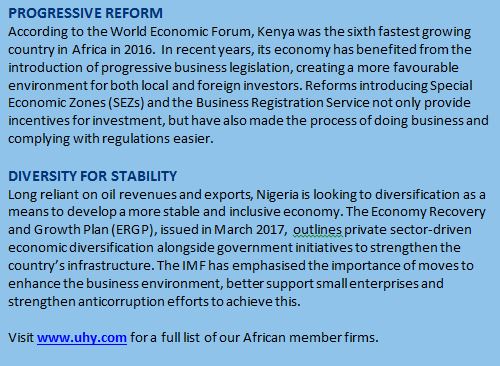 The ‘continent of despair’ or an untapped market eager for new products and services? Africa, it seems, can be both. Making the most of opportunities ahead of competitors is not a question of boldness, but of having an eye for detail beyond the headlines – and an ear for advice.
The ‘continent of despair’ or an untapped market eager for new products and services? Africa, it seems, can be both. Making the most of opportunities ahead of competitors is not a question of boldness, but of having an eye for detail beyond the headlines – and an ear for advice.
The continent of Africa has emerged as one of the fastest growing markets in the world, with imports rising around 7% a year for the last two decades. At this rate of growth, African countries could be spending USD 500 billion in the next 20 years. But many African countries still have serious problems – corruption, an informal sector that is often larger than the tax-paying formal sector, and trade deficits resulting from a low level of exports, in turn due to a dearth of larger manufacturers. One of the biggest challenges for any business looking to find partners, suppliers or investors is poor compliance with international standards.
Headline stories have largely focused on falling commodity prices, declining Chinese demand and political instability. Counter that, however, with predictions such as that of Mohammed Dewji, president and CEO of MeTL Group and one of the region’s most successful entrepreneurs. Presenting to the World Economic Forum in January 2017, he advised businesses to look beyond the headlines and tipped 2017 to be the year the continent bounces back.
“Here on the ground, I am seeing something different,” says Mohammed Dewji. “An environment where private-sector-led investment is starting to flourish, in large part thanks to government-led far-reaching economic and political reforms.”
And here lies the secret to understanding the opportunities and risks Africa presents – in a continent of 54 very different countries, “on the ground” is what counts. For any company considering business within an African country, that means access to up-to-date local knowledge and expertise. It is this grassroots information that help businesses tap into the potential and gain advantage over those competitors who look only at the macro level.
RAISING STANDARDS
The message across the continent, however, is that small- to medium-sized enterprises are missing out on contracts and joint enterprises through a lack of compliance. Not only does this make partners and customers wary, but it also blocks access to cheaper financing from foreign investment.
“Joint ventures with foreign companies are few and far between, because local companies tend to fail at the due diligence levels, which makes them high risk,” says Sam Thakkar, managing partner, UHY Thakkar & Associates, Uganda. “All it needs is for SMEs to become more innovative in their approach and they would be in a better position to expand their businesses. They would also open up more opportunities for external investors and customers.”
Uganda is also not alone in recognising non-compliance as a major block to doing business and to economic growth. It is also not alone in seeing the start of change for the better. Among the other African countries now working to raise the bar are Mozambique, Angola, Ghana and Zambia.
DIVERSIFYING FOR THE FUTURE
While Angola has not had a good reputation for compliance and transparency historically, there have been changes, including tax and regulations reform. A newly developed accounting and audit board regulates financial operations and is just one step away from becoming part of the international standards boards.
“Africa continues to be a challenging, yet attractive, place to invest,” says Armando Paredes, managing partner, UHY A Paredes e Associados-Angola Auditores e Consultores, SA, in Angola.
Angola’s economy, he says, is driven by oil and has been hit by mismanagement of its fortune from its heyday and a lack of industry diversification. To remedy this, the government is now pushing for other sources of income, including manufacturing, farming and fishing. The promise is of new opportunities in many underdeveloped sectors, albeit that the high cost of entry and the bureaucracy make it a difficult leap for many businesses.
“For companies looking to move into Angola, the key is to have a plan in place for developing a local workforce and for forging partnerships,” advises Armando. “SMEs need local expertise and that is really our forte – detailed information about the path to follow and the steps in whatever type of partnership a company chooses.”
NEW STABILITY
Years of civil war between the government and the right-wing Renamo militant organisation have certainly not been conducive to doing business safely or successfully in Mozambique. But, says, Carlos Sitoe, managing partner, UHY Sociedade de Ensino e Consultoria (SEC) in Maputo, peace talks could herald a new era for the country.
“Mozambique actually experienced growth of around 8% between 2010 and 2014, but political instability over the last three years has halved our economic growth rate,” says Carlos. “Current talks look promising and could see the economy move into growth again. Peace will create enormous opportunities for inward investments, both from Africa and internationally.”
Carlos sees potential in significant changes to agribusiness in Mozambique, along with the exploitation of oil and gas resources.
“The government is now ensuring people can do business in Mozambique with fewer constraints,” adds Carlos. “And we are playing our part by sharing information and carrying out training so that SMEs can improve their compliance with international standards and regulations.”
MATCHMAKING ‘HEALTHY’ COMPANIES
“Uganda has seen stability now for over 30 years and the country intends to become a powerhouse for East Africa over the next 20 years,” says Sam Thakkar. “There is new thinking on corporate governance, new standards that meet international requirements, and development to help Ugandan companies maximise their involvement.”
Take oil and gas, which is expected to generate USD 25bn over the next seven to ten years. The Ugandan government is encouraging joint ventures, with the stipulation that 48% of each venture must be Ugandan-owned. SMEs in Uganda have just as much a chance of winning the multi-million dollar contracts as anyone else.
“We are already working with international oil companies to see how a professional firm like ours can help both sides ensure compliance. We have taken part in the review of the creation of a National Supplier Database and are talking to venture capitalists, private equity companies and individual investors in the UK, USA and other countries who are desperate to tap into the African markets. We will work with them to see how we can ‘marry’ them to healthy local companies. A similar drive is expected in agri-processing.”
INVESTMENT POTENTIAL
Henry Djangmah, international liaison partner, UHY Voscon Chartered Accountants, Ghana, highlights oil and gas production, healthcare, agriculture, mining, tourism and financial services as some of the sectors with the most to offer business investors.
“The lack of compliance with international standards and regulations by SMEs is an issue in our country however, as this inhibits attraction of finance and external partnerships,” acknowledges Henry. “This issue stems from the fact that firms tend to lack competency in corporate governance.”
Meanwhile, Ghana’s Ministry of Food and Agriculture is starting a number of projects to facilitate agriculture and agribusiness, and the government and donors such as the World Bank and the United States are promoting horticulture. There are opportunities too in tourism and leisure, and in what Henry describes as “one of the continent’s brightest prospects” – financial services.
“Our office offers training to our clients’ finance staff, assistance in setting up internal processes and system audits to give them an advantage over their competitors,” he says, adding that these services sit well alongside more specialised corporate advisory services for investors, such as mergers and acquisitions, due diligence and capital formation.
ADDING VALUE
“We see a lot of poor compliance with standards and regulations,” says Kelly Mwansa, tax specialist at UHY AMO Certified Public Accountants in Lusaka, Zambia. “This also links to a lack of working capital and the high cost of interest to acquire it.
“At the same time, there is great potential for businesses that can add value to the copper industry, as well as prospects in agriculture and related areas, and in hydro and solar power generation and distribution.”
The Zambian economy is highly dependent on the price of copper, so economic swings are common here. Zambia’s central location is, however, a major advantage for trade with the rest of the continent, and the Zambian government is working on bilateral trade agreements with neighbouring Angola and the Democratic Republic of Congo.
“The Zambian government is working hard to create a better environment for business,” says Kelly, “including the Investment Promotion and Protection Agreement (IPPA), incentives for firms investing in the Multi-Facility Economic Zone and PPP development opportunities.”
LOOKING FORWARD
The business landscape has been changing fast, says Mohammed Dewji – the result of increased regional mobility, and rapid urbanisation and population growth, which have boosted demand for African-manufactured products and services.
“Doing business in Africa offers some unique obstacles, but also endless opportunities,” says Henry Djangmah. “With fewer political struggles and economic growth rates now competitive with those of other developing regions, Africa is changing for the better.”
Sam Thakkar agrees. “There are problems everywhere in the world now. The UK and Europe are grappling with Brexit, and the world is adjusting to the new US administration. Putting these issues together, I think many countries in Africa are looking very promising indeed.”
With the public sector facilitating the establishment of Africa’s biggest economic bloc – with the potential to culminate in a Free Trade Area spanning the Cape to Cairo – the next great investment destination for 2017 may very well be Africa.


Notes for Editors
UHY press contact: Dominique Maeremans on +44 20 7767 2621
Email: d.maeremans@uhy.com - www.uhy.com


